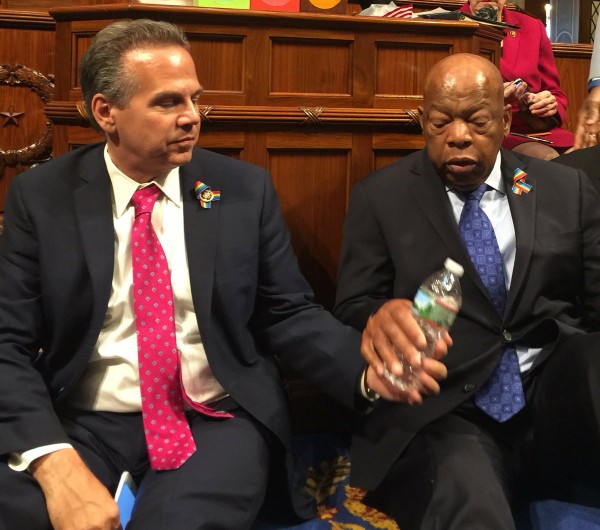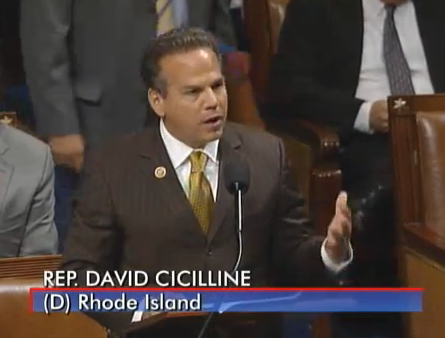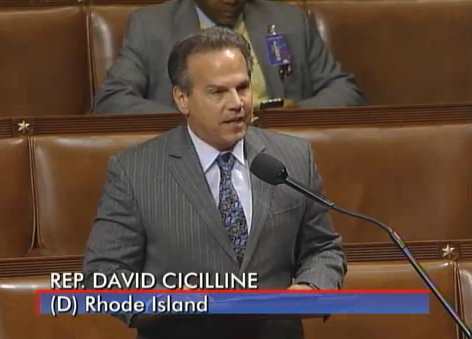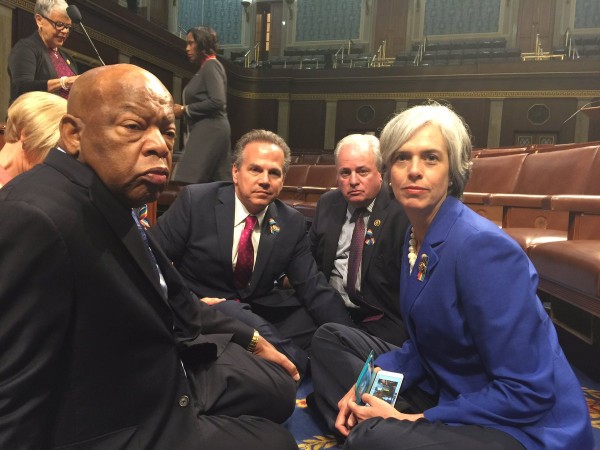 On August 14, 1935 President Franklin Roosevelt signed the Social Security Act into law, perhaps one of the greatest and most important strands of the fraying American social safety net.
On August 14, 1935 President Franklin Roosevelt signed the Social Security Act into law, perhaps one of the greatest and most important strands of the fraying American social safety net.
On Tuesday, Congressmen David Cicilline and John Larson of Connecticut are celebrating social security’s 81st birthday in East Providence, in the community room of Rumford Towers, 95 Newman Ave.
“An estimated 165 million workers are covered by Social Security, with nine out of ten individuals age 65 and older receiving these benefits,” according to a news release from Cicilline’s office. “A recent study by the Center on Budget and Policy Priorities found that Social Security keeps at least 22 million Americans out of poverty.”
But celebrating FDR’s achievement isn’t enough.
“Cicilline and Larson have introduced the Social Security 2100 Act (H.R. 1391) to expand benefits, cut taxes for millions of seniors, and ensure Social Security remains solvent through the end of the century,” said the news release. “Expanding benefits for current and future seniors will provide greater economic security and dignity at a time when millions of Americans are increasingly concerned about their retirement.”
The event is open to the public. It will be held at 3:30 in the Community Room at Rumford Towers, 95 Newman Avenue, in East Providence.
]]> Following on their successful sit-in action last week on the House floor to call attention to gun violence in America, Rhode Island congressmen David Cicilline and Jim Langevin are hosting a local action called “No More Silence: A Public Sit-In to Reduce Gun Violence.”
Following on their successful sit-in action last week on the House floor to call attention to gun violence in America, Rhode Island congressmen David Cicilline and Jim Langevin are hosting a local action called “No More Silence: A Public Sit-In to Reduce Gun Violence.”
The event will be on Wednesday, 3pm at the Providence Public Safety Complex.
Cicilline and Langevin both participated in the historic sit-in on the House floor last week that was organized to call attention to the GOP’s inaction on gun safety following the horrific Pulse massacre in Orlando that left 49 innocent people dead.
The follow-up event is being billed, by Cicilline spokesman Rich Luchette, as an opportunity to “discuss ways for Rhode Islanders to continue to push Republicans in Congress on ‘no fly, no buy’ and universal background checks,” he said.
Cicilline was an organizer of the 26-hour House floor sit-in, along with Georgia Congressman John Lewis, which for 12 hours prevented Republicans from conducting congressional business.
“Republicans can no longer ignore the voices of millions of Americans who are demanding commonsense legislation to address this epidemic,” Cicilline said in a statement following the protest action. “It is shameful that Speaker Ryan, using a procedural maneuver, adjourned the House in the dark of night, shortly after his party voted for another Wall Street giveaway, so that Republicans would not have to address the very real impact of gun violence. This isn’t Wall Street’s House – it’s the People’s House – and it’s time Republicans start acting like it by addressing the important issues facing American families. When the Speaker calls the House back into session we will continue to stand up once again for our constituents who are demanding we take action to reduce gun violence in our country.”
In a letter to congressional colleagues, the six organizers of the sit in wrote:
]]>Dear Colleagues:This week, Democrats in Congress made history while the world watched. Our sit-in showed that the Republican Leadership can no longer ignore the epidemic of gun violence. A movement was born and will only continue to grow.We ask you to join us in a National Day of Action on June 29, 2016. While you are back home in your District, you can continue to build the momentum and engage your community. Whether it a press conference, roundtable, or telephone town hall, we encourage you host an event showing that Democrats in Congress will keep up the fight against gun violence. Local partners including survivors, law enforcement and faith leaders can be excellent partners and can help carry our message even further.We look forward to working with you as we continue our fight to bring commonsense, bipartisan, gun violence prevention legislation up for a vote. Together, we can give voice to the overwhelming majority of the American people who want to see their Congress take action to help keep our communities safe.Sincerely,John LewisJohn B. LarsonKatherine M. ClarkDavid N. CicillineRobin KellyMike Thompson
 Congressional Democrats shut down the U.S. House of Representatives by staging a sit-in on the floor that lasted more than 12 hours, led to disarray and physically prevented Speaker Paul Ryan from conducting business.
Congressional Democrats shut down the U.S. House of Representatives by staging a sit-in on the floor that lasted more than 12 hours, led to disarray and physically prevented Speaker Paul Ryan from conducting business.
They were protesting against House Republicans who refuse to allow a vote on a bill that would get guns out of the hands of suspected terrorists. The civil disobedience was organized, in part, by Rhode Island Congressman David Cicilline. Georgia Congressman John Lewis, a hero of the Civil Rights Movement, was the undisputed leader and moral compass of what some called the “beginnings of a movement.”
The planned direct action began shortly after 11am. RI Future reported on it just before 1pm. Shortly after 1am, Speaker Ryan and House Republicans called for vote to adjourn until July 5 at 2:30 am. Minority Leader Nancy Pelosi said Republicans were sneaking out in the dark of night.
Earlier in the evening, Ryan was shouted down when he tried to conduct business and he retreated from the speaker’s rostrum. Democrats chanted “shame, shame, shame” as he and his fellow Republicans left the chamber. From the back of the chamber, Republicans tried briefly to shout down the Democrat’s protest. One yelled “radical Islam” over and over. The civil disobedience had devolved into bedlam. The New York Times called it a “remarkable scene of pandemonium.”
Democrats held control of the chamber for four more hours, broadcasting live not through the traditional TV cameras in the Capitol but rather through the Periscope and Facebook Live feeds of legislators.
“Still here,” Cicilline tweeted just after midnight.
Still here. Sit-in continues with @repjohnlewis, @RepKClark, and @RepTerriSewell. pic.twitter.com/0dueOajZom
— David Cicilline (@davidcicilline) June 23, 2016
Cicilline was lauded by his colleagues throughout as a leading voice and organizer of the effort. RI Rep. Jim Langevin also participated, but Cicilline played a leading role throughout the event. He stood next to Rep. Lewis for much of the evening and even joined in the mayhem when Republicans made a failed effort to regain control early in the evening, shouting at House security who tried to remove spectators from the balconies, which are typically off limits to the public when the House is in session, saying “This is the people’s House!”
In a speech he delivered just after 2am, Cicilline said, “We’ve now been here for about 14 hours and I just want to make sure everyone understands what House leadership is about to do. We all talk about the great promise of America … none of it is real if we can’t keep people alive. We tried to have a discussion about these sensible ideas. The American people are going to wake up in the morning and realize the Republicans allowed us to do nothing about this problem. Shame on them for blocking these common sense proposals.”
House Democrats are calling for a floor vote on a bill that would deny guns for people being investigated as terrorists. While a similar bill was defeated in the Senate, Speaker Ryan has not let it come up for a vote in the House.
Outside Congress, a protest of the people convened. “In my 5 decades in Congress, I’ve never seen us come together like this,” said Michigan Congressman John Conyers.
The gravitas of Congressman Lewis, who has endured brutal beatings from the police for protesting during the Civil Rights era, was palpable throughout the affair.
“Thank you for getting in trouble,” he said during one of his speeches during the action. “By sitting-in you are standing up. I don’t know what the end is going to be. But my idea: just stay here. Just stay here.”
]]> Congressman David Cicilline told President Barack Obama to increase tenfold the number of Syrian refugees the United States accepts – from 10,000 to 100,000.
Congressman David Cicilline told President Barack Obama to increase tenfold the number of Syrian refugees the United States accepts – from 10,000 to 100,000.
“We’ve always been a beacon to the rest of the world,” Cicilline told RI Future, in explaining why he implored the president to do more. “It speaks to our character as a nation. We need to regain that moral high ground.”
Earlier this month the Obama Administration announced it would increase the number of Syrian refugees the US takes in this from about 1,500 to 10,000. Subsequently, Cicilline wrote a letter to the president saying the US should take in 100,000 Syrian refugees.
“Other countries look to the United States to lead when it comes to refugee resettlement, and so it is absolutely critical that the U.S. lead by example,” reads the letter. “The U.S. should use its considerable global influence to encourage other nations, including within the European Union, to accept additional refugees and increase the resources available to support them.”
- Cicilline letter to Obama on accepting 100,000 Syrian refugees
- More news: Diossa to Obama: Central Falls will take in Syrian refugees
More than 70 members of Congress co-signed the letter to Obama, including Joe Kennedy, of Massachusetts. Congressman Jim Langevin did not sign the letter. Langevin spokeswoman Meg Geoghegan said, “While he shares Congressman Cicilline’s belief that the U.S. should do far more for these refugees, he does not feel comfortable prescribing that specific number until we have assurances that the resources exist to actually process that many people in a timely way without risking any potential impact to American security.”
Langevin told RI Future in a prepared statement: “We are facing one of the worst humanitarian crises in history, and our country and others around the world must do more for those who have faced unimaginable suffering, leaving their homes behind in fear for their families. The United States must significantly increase the number of refugees we take, while ensuring adequate resources to protect the security of our citizens.”
Cicilline said his request to accept 100,000 Syrian refugees is based on the recommendation of the Refugee Council USA, a coalition of 20 of the leading refugee aid organizations in this country. Refugee Council USA also recommends the United States increase the overall number of refugees it takes in this year from 100,000 to 200,000. Last year, the US accepted about 70,000 refugees but only 1,500 from Syria, which has seen an exodus of more than 4 million citizens since the start of a bloody civil war four years ago.
Cicilline’s letter points out that accepting 100,000 Syrian refugees would only increase the US population by “less than a quarter of one percent” while “Lebanon’s population by contrast has grown 25% with the influx of refugees at its borders.” In a reference to the viral video of a Syrian boy who died while fleeing his country, the letter continues, “How can we tell little Aylan’s family that we simply can’t manage to welcome them, that it would be too dangerous or take jobs away. Surely we can do better.”
Cicilline visited Syrian refugee camps on a recent trip to Jordan, which helped cement in his mind the need for the United States to be a leader in responding to the crisis. In a conversation with a Jordanian man, he explained that there is some political resistance to accepting Syrian refugees in the United States. The Jordanian man told him, “This wasn’t a debate. These are our brothers and sisters fleeing war and we welcomed them,” according to the congressman.
Cicilline also said taking in refugees is a “sensible economic decision,” saying “in 2013 69 percent of all refugees were self-sufficient after 180 days. By comparison, refugees living in camps around the world are often relying on international assistance for a very long time – 10, 15, 20 years – and in most cases the United States is paying for most of that.”
Cicilline spoke earlier this week in Washington at a press conference about the Syrian refugee crisis.
]]> Congressman David Cicilline met Wednesday with local child care workers to discuss the need for high quality care that pays a living wage.
Congressman David Cicilline met Wednesday with local child care workers to discuss the need for high quality care that pays a living wage.
“It’s time for Congress to take action to ensure that high quality, affordable child care is accessible for every American family,” said Cicilline. “And that the childcare workforce can access the training and wages they need to make a living.”
Cicilline joined a forum of 11 child care workers, state representatives, and local parents to discuss House Resolution 386, which recognizes the need for better child care for the working parents.
Among possible solutions identified by the participants on Wednesday, raising the minimum wage to $15 per hour for child care workers was the most popular.
“They want us to better ourselves, but we need help,” said Nichole Ward, a certified nursing assistant and mother of two. Ward spoke of the difficulties finding care for her two children while working and going to school at the same time.
Ultimately she had to ask her family to watch her children as childcare proved too expensive, a common solution for working families. Ward explained that her children had “fallen behind.” in their educations. Her mother and sister “aren’t teachers,” unlike the child care providers, and cannot provide the vital early childhood development.
“Between 2007 and 2015, funding for Rhode Island’s subsidized child care program shrank by 30 percent (from $71 million to $51 million),” said Rachel Flum, senior policy analyst at the Economic Progress Institute. “The reduction was primarily in state support for the program which was accomplished by reducing eligibility – causing hundreds of families to lose coverage.”
Cicilline cited a University of California, Berkeley study that found child care workers are paid less than $10 an hour and wages have stagnated with no real increase since 1997 while at the same time child care costs have doubled.
“Pay the workers like their work matters,” said Marti Murphy with Fight for 15, an advocacy group currently celebrating victories big and small across the nation.
Cicilline expanded that childcare is becoming the “biggest number, bigger than rent, bigger than food.”
“Things are different now than 25-years-ago,” he said, talking about the need for Congressional action. “We can’t pretend it’s 1950…and recognize the reality that both parents are working.”
Added Chas Walker of 1199 SEIU New England, “From 1-5-years-old are the most important years in a child’s life. We have to value the people providing the care for them.”
]]> The lines are drawn on a proposed nuclear containment deal with Iran. President Obama and “peace-loving” progressives are united in support while the GOP is unsurprisingly against it. Stuck in the middle are the American people and congressional Democrats.
The lines are drawn on a proposed nuclear containment deal with Iran. President Obama and “peace-loving” progressives are united in support while the GOP is unsurprisingly against it. Stuck in the middle are the American people and congressional Democrats.
A new poll from Monmouth State University released Monday shows 41 percent of respondents are unsure if the deal should be inked while 32 percent think lawmakers should not support it and 27 percent think they should. And according to The Hill, 35 House Democrats support the deal and 29 are undecided while 18 Senate Democrats support and 20 are undecided.
The Rhode Island congressional delegation is on the fence, too.
“Congressman Langevin continues to review the agreement and consider the options in advance of Congressional action this fall,” said his spokeswoman Meg Geoghegan. “He has not yet made a final decision on how he will vote on the issue.” Rich Luchette, a spokesman for Congressman David Cicilline said simply, “Congressman Cicilline is reviewing the proposed agreement.”
Senator Sheldon Whitehouse “hasn’t announced a position on the Iran deal yet,” according to spokesman Seth Larson. And Chip Unruh, spokesman for Senator Jack Reed, said the ranking member of the RI delegation, and a nationally-regarded foreign policy expert, “continues to thoroughly review.”
As a ranking member of the Senate Armed Services Committee, Reed has been conducting hearings on the issue with Arizona Sen. John McCain. The Hill lists Reed in the yes column but RIPR coverage from July 16 says Reed “has not decided whether he supports President Barack Obama’s nuclear deal with Iran.” Unruh said The Hill “must be speculating.”
Speculation or not, The Hill lists noted progressive leaders Elizabeth Warren and Bernie Sanders as supporting the deal.
This agreement is obviously not all that many of us would have liked but it beats the alternative – a war with Iran that could go on for years,” Sanders said, according to The Hill. And quoting her from the Boston Globe, Elizabeth Warren has said, “The question now before Congress — the only question before Congress — is whether the recently announced nuclear agreement represents our best available option for preventing Iran from acquiring a nuclear weapon. I am convinced that it does.”
Progressives have largely supported the deal with Code Pink calling it “a great victory for peace-loving people around the world.” The New York Times has a 200 word summary of the deal.
]]> President Barack Obama is aligning with Republicans and corporations while openly bickering with Sen. Elizabeth Warren and is on the opposite side of “most Congressional Democrats” over a potential Trans Pacific Partnership deal.
President Barack Obama is aligning with Republicans and corporations while openly bickering with Sen. Elizabeth Warren and is on the opposite side of “most Congressional Democrats” over a potential Trans Pacific Partnership deal.
The president is also largely at odds with Rhode Island’s congressional delegation on fast-tracking a potential trade compact with 12 Pacific Rim nations. Of the Ocean State’s four elected officials in Congress, three have now spoken out against giving Obama fast track authority. Only Senator Jack Reed is still holding his cards close as the Senate Finance Committee considers granting the president trade promotion authority today.
Senator Sheldon Whitehouse said he opposes fast track authority for the TPP deal, he told RI Future exclusively today.
“It would be a mistake to provide fast-track authority for trade agreements that could further undermine American wages, manufacturing jobs, and our environment,” he said in an emailed statement. “We need the opportunity carefully review any proposed trade agreements to ensure we’re not repeating the mistakes of past free trade deals.”
In February, Whitehouse gave a speech against trade agreements in general on the Senate floor in February, saying: “I start with a state that has been on the losing end of these trade deals. People say that they are going to enforce the environmental and human rights and labor and safety requirements of these agreements. I haven’t seen it. And I gotta say I don’t like the process very much either. It is secret, we are kept out of it. Who’s in it is a lot of really big corporations and the are up to, I think, a lot of no good in a lot of the deals.”
Congressman David Cicilline is against it, too. He wrote this op/ed in the Providence Journal last month.
“Any agreement that promotes fast-track trade to advance the Trans-Pacific Partnership without thorough review and Congressional input is a bad deal for Rhode Island workers,” he told RI Future yesterday. “Congress should play an important role in making sure trade policies are fair for American workers, businesses, intellectual property holders, and consumers. The fast-track model undercuts oversight of trade agreements and makes it more difficult to protect the interests of working families. We should be working to promote American manufacturing, implement flexible workplace policies that benefit middle-class families, and finally raise the minimum wage so everyone has an opportunity to succeed.”
Also yesterday, Congressman Jim Langevin reaffirmed his opposition to a TPP deal. In February he and Cicilline signed onto a letter opposing it and yesterday he emailed this statement to reporters:
“The United States has been working with TPP negotiating partners for more than three years. This agreement could greatly shift global trading patterns and accordingly deserves the highest level of scrutiny to ensure it does not displace U.S. jobs or undermine our country’s competitiveness. While I favor expanding global trade, it is important that any free trade agreement places American workers and companies on an enforceable level playing field with foreign trading partners when it comes to labor rights, environmental regulation, intellectual property protection and other critical issues. For that reason, I am opposed to passing Trade Promotion Authority legislation with respect to the TPP.
“Congress has the responsibility to set trade policy, and ‘fast track’ procedures largely circumvent this important review. There is a better way to make decisions of this magnitude that significantly impact America’s place in the global economy, and that must include robust debate and discussion from all partners, including Congress. I will continue to work to ensure that trade agreements protect American workers and consumers and do not undermine America’s ability to compete in the global market.”
Reed, on the other hand, isn’t as vocal, according to spokesman Chip Unruh, who said Rhode Island’s senior senator “will take a look at the Finance Committee’s proposal, but he wants to ensure any trade agreement benefits Rhode Island consumers, workers, and businesses.” Unruh noted Reed rejected such TPA authority in both 2002 and 2007.
According to the Washington Post “most Congressional Democrats are opposed” but Oregon Senator Ron Wyden is pushing for a deal that he says has benefits for liberals.
In March the New York Times reported the “ambitious 12-nation trade accord pushed by President Obama would allow foreign corporations to sue the United States government for actions that undermine their investment “expectations” and hurt their business, according to a classified document.” The Nation called the TPP proposal “NAFTA on steroids” in 2012.
]]> Rhode Island Congressman David Cicilline is drafting a bill with Senator Jeff Merkley of Oregon that would extend civil rights protections to LGBT people, he explained in an interview with RI Future.
Rhode Island Congressman David Cicilline is drafting a bill with Senator Jeff Merkley of Oregon that would extend civil rights protections to LGBT people, he explained in an interview with RI Future.
The bill, long in the works, he said, would prevent states like Indiana from using so-called “religious liberty” laws to sanction discrimination based on sexual orientation.
“Many of us started to feel that the time had come to approach LGBT equality in a different way,” Cicilline said. “Why aren’t we putting together a comprehensive bill that prohibits discrimination against the LGBT community, period? We looked at a variety of federal protections that exist in the civil rights area based on race, and gender, and ethnic origin and religious tradition … why don’t we just add sexual orientation and gender identity to those existing categories that are protected from discrimination.”
Cicilline is co-chair of the LGBT Equality Caucus and, according to a press release, “one of six openly gay Members of the U.S. House of Representatives.” When asked about Indiana’s Religious Freedom Restoration Act (RFRA), he said: “The law permits discrimination, which it should not. It should be repealed.”
When I asked Cicilline about Indiana Gov. Mike Pence’s attempt to “clarify” the new law, Cicilline said, “It’s very hard to enact a law that discriminates against people or permits discrimination based on sexual orientation and then try to clarify that away.”
I also asked Cicilline if he’s ever been the victim of discrimination based on his sexual orientation. Listen to the full interview to find out what he said:
]]> “We are a nation of laws and principles,” said Rhode Island Senator Jack Reed about the now-declassified CIA torture practices made public yesterday in a Senate Intelligence Committee report. “This report highlights a systemic failure to uphold those laws and principles. It is troubling and difficult to digest, but it’s important to have all the facts to prevent a repeat of these mistakes.”
“We are a nation of laws and principles,” said Rhode Island Senator Jack Reed about the now-declassified CIA torture practices made public yesterday in a Senate Intelligence Committee report. “This report highlights a systemic failure to uphold those laws and principles. It is troubling and difficult to digest, but it’s important to have all the facts to prevent a repeat of these mistakes.”
The Senate report, more than five years in the making, details how CIA agents tortured suspects in the so-called war on terror to little or no avail and systematically lied to Congress and the American public about the efficacy of such techniques.
Reed, a senior member of the Armed Services Committee who is often on the short list for a high-level position in the Pentagon, said in a statement: “The use of torture is abhorrent and stands in stark contrast to our constitution and values. It is not an effective tool to obtain reliable intelligence. As we continue to confront the threat of terrorism at home and abroad, we are reminded that we are stronger as a nation when we remain true to our democratic principles.”
Senator Sheldon Whithouse was a member of the Senate Intelligence Committee in the early stages of developing the report. He’s taken an active role in opposing torture, such as chairing a 2009 Judiciary Committee hearing on torture during the Bush Administration.
Whitehouse said of the report in a statement sent out yesterday, “After years of effort and millions of documents reviewed, the Senate report at last lays out in painstaking detail how the CIA under President Bush and Vice President Cheney turned down the dark path to torture, and then to cover its tracks misled Congress and executive officials about the efficacy of the torture program. These are hard facts to face as Americans, but it’s important that the facts be known. Chairman Feinstein and our Intelligence Committee staff deserve our country’s deep appreciation for their extraordinary efforts.”
Congressman David Cicilline, a member of the House Foreign Intelligence Committee, said in a statement: “The Senate Intelligence Committee’s report is deeply disturbing. Among the many findings, this report reveals that the CIA employed more brutal interrogation techniques than had been previously detailed publicly, deliberately misled Congress and the White House about the program’s effectiveness, and damaged the United States’ reputation around the world. These abuses are a violation of basic human rights and are in stark contrast to our values as a nation, and this report provides further confirmation that these techniques simply fail to provide results that strengthen our national security. I applaud the members of the Senate Intelligence Committee for their efforts to provide the American people with an account of the actions carried out in their name. It is now our duty as elected officials, and American citizens who believe in the values upon which our nation was founded, to ensure serious violations such as this never occur again.”
And said Congressman Jim Langevin in a statement: “I am deeply concerned by the findings of the Senate Intelligence Committee. The tactics detailed in the report are contrary to American values, and these programs have been rightly ended. Human rights must be preserved in times of peace and war, and I sincerely hope we can learn from this dark moment in our history.”
]]> “Like many Rhode Islanders,” Congressman David Cicilline said in an email to RI Future, “I’m saddened by the recent loss of life in Ferguson and New York City, and understand the frustration felt by so many Americans. We know that effective policing requires the trust and respect of the community and these events have undermined the confidence many people have in law enforcement’s ability to treat everyone equally under the law. We have a responsibility to find a solution to this problem.”
“Like many Rhode Islanders,” Congressman David Cicilline said in an email to RI Future, “I’m saddened by the recent loss of life in Ferguson and New York City, and understand the frustration felt by so many Americans. We know that effective policing requires the trust and respect of the community and these events have undermined the confidence many people have in law enforcement’s ability to treat everyone equally under the law. We have a responsibility to find a solution to this problem.”
For decades, Cicilline has been working on a solution.
As a congressman, as mayor of Providence and as a lawyer in private practice, Cicillne has throughout his career been ahead of the curve on rooting out racial profiling.
“Racial profiling is wrong and creates more problems than it solves,” he said in an email to RI Future. “When individuals are targeted because of their race, the most important crime-fighting tool police officers have, the trust of the community, is damaged.”
Cicilline, D-RI, is one of 60 co-sponsors of Congressman John Conyers’ 2013 End Racial Profiling Act. The bill is similar to the new federal rules announced Monday by the Justice Department with the very notable exception that an act of Congress would apply to state and local law enforcement agencies. The new Justice Department guidelines apply only to federal law enforcement officers.
“I welcome Attorney General Eric Holder’s update of racial profiling guidance for federal law enforcement agencies,” Cicilline told me. “This is a step in the right direction, but we must go further and end racial profiling wherever it may occur. The End Racial Profiling Act will address the root cause of racial profiling, protect individuals’ civil liberties and educate law enforcement on the differences between a suspect description and discriminatory profiling.”
The bill, according to this summary, defines racial profiling as: “the practice of a law enforcement agent or agency relying, to any degree, on race, ethnicity, national origin, gender, or religion in selecting which individual to subject to routine or spontaneous investigatory activities, or in deciding upon the scope and substance of law enforcement activity following the initial investigatory activity, except when there is trustworthy information relevant to the locality and timeframe that links a person of a particular race, ethnicity, national origin, gender, or religion to an identified criminal incident or scheme.”
It would require police departments to develop policies aimed at eliminating racial profiling and would create federal guidelines for collecting data.
As mayor of Providence, Cicilline put together “a plan for tackling racial profiling, a practice that the city’s police have been charged with engaging in,” according to Rhode Island Lawyer’s Weekly.
The plan was critiqued by the ACLU but won praise by the Police Assessment Resource Center. The group said the action plan contained “several recommendations, such as more police/community interaction, data collection and analysis, and mandatory diversity training for officers every two years. Under the plan, officers found to have engaged in racial profiling would be required to attend counseling and training sessions, and could face reprimands or dismissal.”
Cicilline campaigned for mayor, in part, on reforming the police department. He won some praise from the late Providence Phoenix, and even Steve Brown of the ACLU. Wrote Wrote Ian Donnis in 2003:
“It will take time to change public perceptions, particularly in the poorer Providence neighborhoods where police-community relations are most in need of improvement, but many observers are optimistic about the outlook. As put by Steve Brown, executive director of the Rhode Island chapter of the American Civil Liberties Union, ‘Things can only go up. I think that’s a fair statement and I have no reason to doubt that they will. The mayor has certainly demonstrated in his other roles a strong concern about this issue. I would be very surprised if we didn’t see some significant changes in police-community relations.'”
One of the ways Cicilline demonstrated his commitment to police-community relations was as the initial lawyer in the Bernie Flowers case. Flowers was a 50-year-old African American who in September of 2000 was pulled over at gunpoint by the Westerly police. He sued the Westerly police department for violating his civil rights.
“This lawsuit is intended to hold accountable the police who violated Mr. Flowers’ civil rights and to discourage others from engaging in this kind of racial profiling, which continues to be one of America’s greatest shames,” Cicilline said in an ACLU press release from 2001.
Flowers got a new lawyer when Cicilline became mayor and a federal judge dismissed the lawsuit in 2004.
]]>